Below is a link to the recorded presentation of the 2020 UT Soybean Scout School that was presented today via Zoom. Set aside a little time if you intend to watch. Also keep in mind that much of the same information is available on our other internet resources including http://utcrops.com/soybean/VSSchool.htm and https://guide.utcrops.com/soybean/.
All posts by Scott Stewart, West TN Research & Education Center
Reminder – UT Soybean Scout School via Zoom (July 8th, 9:00 AM – 11:30 AM)
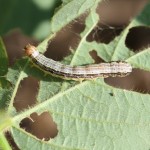 Because of restrictions due to the COVID-19 situation, the UT Soybean Scout School will be offered by Zoom from 9:00-11:30 AM on Wednesday, July 8th. The Zoom link is provided below. However, a password is required. Please contact Ms. LaDonn Kelso (dkelso2@utk.edu) or myself (sdstewart@utk.edu) to obtain the meeting password.
Because of restrictions due to the COVID-19 situation, the UT Soybean Scout School will be offered by Zoom from 9:00-11:30 AM on Wednesday, July 8th. The Zoom link is provided below. However, a password is required. Please contact Ms. LaDonn Kelso (dkelso2@utk.edu) or myself (sdstewart@utk.edu) to obtain the meeting password.
The Soybean Scout School provides training for understanding soybean growth and development and the identification, scouting and basic management of pests including insects, weeds, and disease. Pesticide re-certification points and Continue reading
A Brief Insect Update (June 25, 2020)
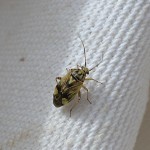
It’s been a generally quite week for insect problem but below are some reminders and suggestions.
Cotton: Most cotton is past the stage where thrips are a concern. Tarnished plant bugs will now be our primary focus for much of the season. Thus far, most reports indicate a slow and sporadic start with plant bugs, but treatments are now being made more widely. However tempting, I encourage people to avoid using Continue reading
Early Season Management of Plant Bugs in Cotton
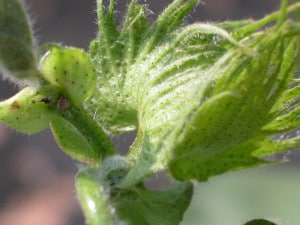
Below are a few reminders as much of the crop will begin squaring in the next week. It’s too soon to know what kind of plant bug year we will have, but there are a couple of truism that generally hold. When we have a wet spring, and particularly a cool spring, infestations in cotton often start a little later than normal. The weedy hosts of tarnished plant bug will stay attractive longer, holding the bugs longer before they migrate into cotton. However, we often since higher than normal populations during mid and late season under the same circumstance. Second, Continue reading
Moth Trapping Data and Southwestern Corn Borers
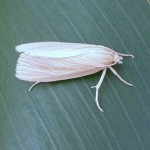
Just a reminder that moth trapping data are collected weekly and reported on this website under the Quick Links menus (http://www.utcrops.com/BlogStuff/2020MothTrappingData.pdf). Moth catches of bollworm (corn earworm) and tobacco budworm are low, typical of this time of year. However, southwestern corn borer traps in some areas are pretty high. For those with non-Bt corn, this is a cause for concern in those areas (and perhaps others). This first generation will be found feeding within whorls until they begin stalk tunneling. You can read more about their management by Continue reading
Cotton Insect Update … Thrips Be Rolling
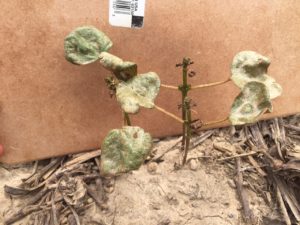
It’s been a challenge getting our crops in the ground, and our planting dates are really stretched out. It is especially important that our late planted cotton gets off to a good start to make up for a little lost time. Unfortunately, the ‘Thrips Infestation Predictor for Cotton’ (https://climate.ncsu.edu/cottonTIP) appears to be dead on in predicting our heaviest thrips pressure will occur in early June, just as our later planted cotton is most susceptible. I’d suggest making an insecticide application to Continue reading
Recording of UT Cotton School (Zoom Training)
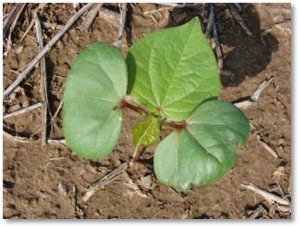 Below please find a link to the recorded zoom training for the 2020 UT Cotton Scout School. It is a rather lengthy training, but you can fast forward and rewind at your discretion.
Below please find a link to the recorded zoom training for the 2020 UT Cotton Scout School. It is a rather lengthy training, but you can fast forward and rewind at your discretion.
http://www.utcrops.com/BlogStuff/2020-UT_CottonScoutSchool.mp4

Reminder – UT Cotton Scout School (8:30, Friday May 29th via Zoom)
Because of the COVID-19 situation, the 2020 UT Cotton Scout School will be held by webinar (via Zoom) on May 29th, beginning at 8:30 AM and ending by Noon. Participants will be required to preregister to receive the Zoom password to enter the meeting. To preregister, please email LaDonn Kelso at dkelso2@utk.edu. She will reply to your message with the Zoom meeting password.
Pesticide re-certification points and Continue reading
